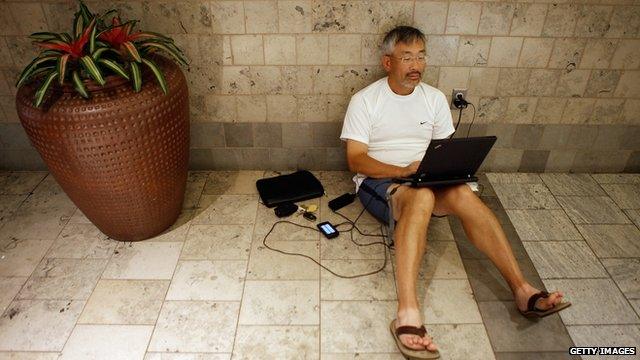The generation dependent on the phone charger
- Published

Please don't disturb me. I'm charging
The European Parliament is voting on whether to have a single charger for all phones. Shorter battery lives mean many are prisoners to their chargers, notes Harry Low.
It's a common sight. We see people plugging in at airports, on trains and in the office. Charging hubs have been springing up at festivals and in eastern European capital cities. One landlady in Norwich has even had her television unplugged by a pesky patron.
The hot spell in London and the south east of England last summer saw a significant rise in sales of portable chargers for mobile phones. They even made it into court when one of those jailed for looting during the London riots was found to have been delivering a phone charger to a friend.
In some ways, shorter battery life is pushing us to revert to our pre-mobile phone ways where we agreed in advance to meet at a set time and place. Jeff Parsons, news editor at technology magazine T3, says the charger provides a temporary solution to a problem which manufacturers have been unable to solve.
"These new devices run even more processes and have newer features that in turn use up valuable power. A bright display, push notifications and Bluetooth connectivity are some of the biggest power drains on a modern smartphone.
"In fact, when used to their full potential, few smartphones are able to last longer than 24 hours without a recharge. Ultimately, no-one wants to be left with a dead phone at a crucial time so it's hardly surprising that many people choose to play it safe and bring a phone charger with them when they travel."
The option of a plug socket, or "power point", is now marketed by train companies when booking tickets for a long-distance journey. But our insatiable thirst for electricity for our gadgets has also thrown up questions of its own. Should you plug in at work? How much does this cost businesses each year? Is it acceptable to sit next to a public plug socket and not use it, thereby stopping someone else?
So next time you sit down in a cafe, be wary of your choice of seat - somebody wanting power may well be watching with envy.
Follow @BBCNewsMagazine, external on Twitter and on Facebook, external